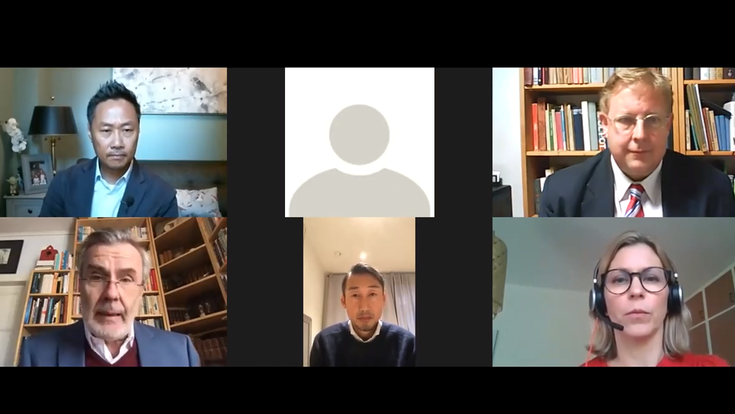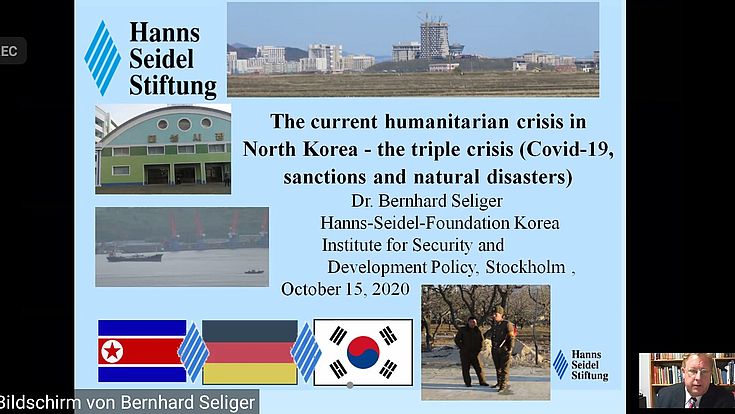Webinar
Sanctions, COVID-19, and Natural Disasters in North Korea
While reports of rising Corona virus cases have been popping up all over the world, according to own data, North Korea is still Corona-free. Analysts and NGOs however are sure that despite this information, North Korea has also been hit by the pandemic. Coupling up with the currently imposed sanctions and various natural disasters worsening the already existing food insecurity, the current humanitarian situation in North Korea most likely looks fatal. Additionally, the self-applied Corona protective measures have further aggravated the country’s isolation, now even rejecting humanitarian assistance from the outside.

As the first speaker of the webinar, Åsa Sandberg, Head of Desk DPRK for the Swedish Red Cross, introduced to her organization’s work in North Korea and pointed out that roughly 10 Million people had been in need of support especially concerning health care already before the outbreak of the pandemic. With a declining insight to the country's humanitarian situation, Sandberg identified the preservation of established communication channels and contacts, as well as of perspectives for future plans, as the top priority.
Following, Kee B. Park, Director of Korea Health Policy Project at Harvard Medical School, elaborated a little on North Korea’s recent investments and work on its health sector. He also stressed that the long-term danger of the pandemic on the DPRK is rather postulated by the self-imposed measures as he predicts that in the long run they could cause more deaths than the virus itself if it were let into the country. Consequently, he emphasized the importance of international support in terms of health in order for a quick reopening of the country

Dr Bernhard Seliger, Representative of HSF Korea, emphasized the importance of fertilizer, usually imported by North Korea, which, amid to the pandemic, is now self-produced since the importation of artificial fertilizer has practically stopped this year. He stressed that this could become a big issue in the following year with North Korea's landscape characterized by a lot of infertile soil, like the infertile stone ground in the Gangwon-do area for example.
Concerning COVID-19, Dr Seliger pointed out that the North Korean government publicly informed about the virus and consequently to the outbreak closed its borders at a very early point. Yet, while movement inside the country is very limited right now due to tightened restrictions, for the 75th anniversary of the DPRK a massive parade was still held in Pyongyang.
Agreeing to Mr. Park, Dr Seliger also underlined that the health system has been a long-term project and furthermore pointed out the positive development in crisis management with quicker responsiveness to disasters added to a newly introduced modern disaster risk reduction strategy. As a future challenge, he identified the growing urban and rural disparities, with the danger of creating a parallel society.
As the last speaker of the webinar, Sangsoo Lee, Head of ISDP’s Korea Centre said that while the impact of the sanctions was still manageable for the North Korean regime, the self-imposed restrictions amid the fight of a spread of the Corona virus would have a more negative effect on the country’s economy. He also highlighted the suffering of children since schools and daycare facilities have been closed in the country whereas the technical equipment for online classes is broadly not available.
In a closing discussion, the panelists agreed on the importance of collaboration and cooperation among NGOs and institutions to find a successful approach despite the current North Korean isolation to eventually reach a quicker reopening at least to aid or urgently needed goods. In order to do this, a special focus should lay on the maintenance of built up contacts in the DPRK at all costs. Here, Seliger pointed out that the HSF luckily is still in contact with its partners, e.g. working on publications together right now.
You can watch the whole recording of the Webinar here.
